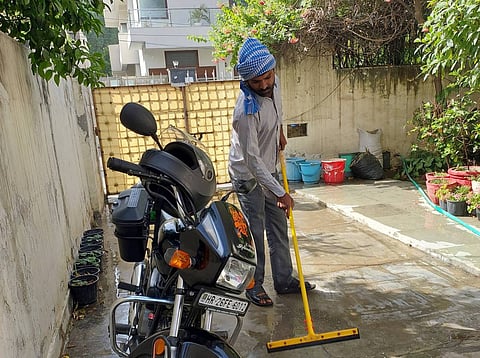

Thirty-five-year-old Ramesh Prajapati is finally the owner of a Hero Splendor motorcycle bought on an easy loan, which he can repay over the next four years, after twenty years of working in the National Capital Region (NCR).
A small farmer from Amethi in Uttar Pradesh, he is using his farming skills as a gardener now, employed in residential areas, managing short-term employment in schools and commercial areas.
"It has been tough in the city," he says with a wry smile, "but here we can earn in cash and there is work to do every day."
In sharp contrast, living in the village is healthier and, yes, more comfortable, but there is a severe lack of work and subsequently very little cash in hand.
From every district of Uttar Pradesh, Ramesh said, every home has at least two members working in the metro cities trying to earn and save money.
"We are not able to get the full benefit of government schemes since it is time-consuming to get the paperwork done," he admitted, adding that since they are illiterate, they have to rely on agents for assistance.
Needless to say, it means more money has to be doled out before it starts rolling in.
'Cows are the main challenge'
Ramesh is committed to farming and his small land-holding.
"I wish I could be working full time on the farm. We get a fairly good harvest of wheat, rice, maize and pulses," he revealed.
Even with an investment of Rs 15,000, a small farmer like him can manage to get a market price of Rs 25-30,000 for the farm produce.
What's the main challenge?
"The cows and monkeys are the main challenge," he laughs, adding, "It is very difficult or rather impossible to fence the land. And millions of cows have been let loose along the main roads and into the countryside. We can do nothing. In the course of one night, two cows can destroy an entire field and the work of an entire season is gone!"
Working as a gardener, Ramesh is able to earn a maximum of Rs 20,000 per month; his wife works as a domestic or helps the aged, chipping in with another Rs 3,000.
'Education is top priority'
"We have small children, my wife cannot be working full time. She manages the home, kitchen and the children. She will be working longer hours as the kids grow up. Right now, their education is top priority. It is expensive; tuitions are necessary too," he pointed out.
In the village, schools have come up.
In fact, private schools are charging as much in a village in Amethi as they are in the suburbs of Gurugram where Ramesh is living in a two-room rented accommodation, paying for water and electricity.
For the likes of Ramesh, their Aadhar, Voter ID, ration card etc, link them to the village home; in the big city, they have to fend for themselves.
"Yes, there is community support," he said, "We are Prajapatis, traditionally the potters or kumhaars, who can double up as masons and construction labour, and we are proud to be working with our hands. My father could not get enough work as a mason and spent over 20 years in Mumbai as a carpenter!"
"We are not given to drinking, smoking or consuming tobacco," he went on to add. "We realize how terrible these addictions can be. Even though chewing tobacco and paan is part of our local culture yet we abstain."
In the Surya Vihar locality of Gurugram where he stays, Ramesh and his group are given to evening prayers, celebrating festivals and organising 'kathas' and Ramayan 'paaths' or reading wherein the entire locality comes together for prayers, cooking the meals together and sharing it with bonhomie and camaraderie.
Hopes
What is it that Ramesh is looking for from the new government?
"Inflation is killing us! Kitchen expenses have become the biggest expense head," he said, shaking his head, although in the village too the prices of vegetables, pulses and cereals is quite the same as in Gurugram!
Government agencies have to step in and make low-cost healthy food a priority, he said. "Our health is at stake. And I am labouring in the sun throughout the day. I need my nutrition, clean drinking water."
These basics of everyday life seem out of reach for these labouring families.
Then security is a big issue too: "Child-lifters abound in the big cities, despite police presence near the schools and market places," he revealed.
Most of the families who lose their children do not report the cases as they don't feel confident with what the police can do.
"We have to be alert, that's all," said Ramesh, acknowledging that it adds hugely to the burden of being in the big city where you cannot let our guard down even for a day.
* Utility bills: Ramesh was up to his neck with electricity bills of Rs 40,000 on account of old and new meters, and the bureaucratic delays in the village. "I finally ended up paying almost Rs 20,000 after there was a waiver announced. But it was a big dent in our savings," he said.
* Effective, low-cost medical services are a crying need. "Private clinics and hospitals are too expensive; government hospitals are too packed with patients," Ramesh said, realizing how important healthcare is for the family. While his mother and brother in the village have the Aayushman Bharat card, he is yet to get his paperwork done.
In other words, no matter how much things change, at one level, they remain the same.